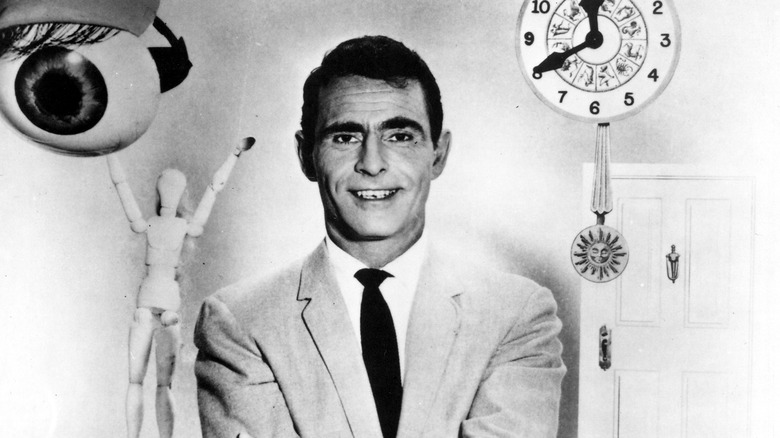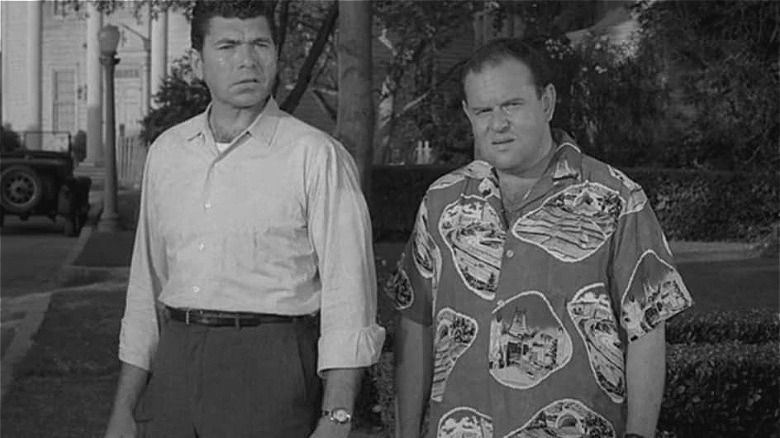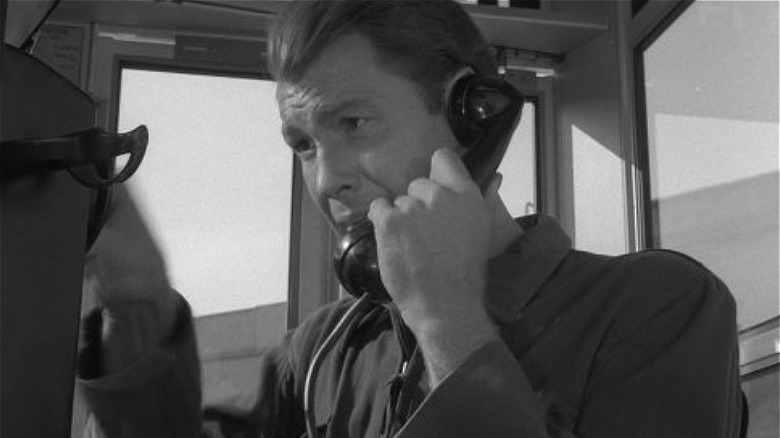How A Failed Experiment From Network Execs Taught The Twilight Zone Its Limits
The enduring legacy of Rod Serling's "The Twilight Zone" can be traced back to how the series revolutionized broadcast television in the 1960s. Described as a "series of imaginative tales that are not bound by time or space or the established laws of nature," "The Twilight Zone" ran for five seasons over the span of five years. Season 1's episode premiere, "Where is Everybody?" appropriately set the tone for the anthology series with its surreal and Kafka-esque qualities. However, somewhere around the fourth season, the show's appeal began to wane. Why did this happen?
The mixed critical response to season 4 was mainly due to Serling's dwindling involvement, along with scriptwriter Charles Beaumont's limited contribution due to illness. In a 1959 interview with Mike Wallace, Serling said that he worked non-stop on the project seven days a week, which made him utterly exhausted in the process. While exhaustion contributed to Serling's measured withdrawal from the show, the real reason "The Twilight Zone" had reached its limits was a structural change demanded by network executives, which didn't sit well with the core team. What was once a half-hour show became an hour-long show.
An experiment that was doomed to fail
In a review of "The Comedian," an episode of Jordan Peele's "The Twilight Zone" reboot series, Paste Magazine explained why the reboot didn't work, comparing it to the original show's fourth season. Serling's "The Twilight Zone" was effective when it followed its swift, frenetic 30-minute episodic structure that ended with a shocking twist or reveal. But when network executives insisted that the episodes be stretched to the 60-minute mark for the fourth season, the pay-off felt cheap and unearned. Here's what happened:
"The experiment was a failure, largely owing to the fact that The Twilight Zone's high-concept premises tended to work best when they were built up quickly and fluidly to their payoffs, without time for the audience to anticipate the twist."
This is true, as some of the best episodes of "The Twilight Zone" are the ones that subvert expectations right at the end, with the build-up to the twists being quick and compelling. For instance, the episode "To Serve Man" takes good advantage of its half-hour runtime by setting up a benevolent first contact with an alien race, which leads to humanity benefitting from advanced technology. Time jumps are incorporated, and the alien agenda seems to be good-natured, as they leave behind a manifesto named "To Serve Man." The ultimate twist of the episode is delivered moments before the ending, where (spoilers ahead!) the manifesto turns out to be a cook book.
Another example of a good, swift "Twilight Zone" episode that capitalizes on its runtime to build atmospheric dread is season 1's "The Monsters Are Due on Maple Street." In the episode, there's anticipation of an alien attack, but humanity turns on itself the moment there's an anomaly in their daily routines, leading to mob mentality and self-destruction. A 60-minute version of the episode would have never worked.
An ode to The Twilight Zone's taut, horrific episodes
The subject matter of the best "The Twilight Zone" episodes was a mix of fantastical and grounded horror, reinforced by themes of isolation, human folly, and the concept of the other. Apart from this, the show's visual vocabulary consisted of some stunning camerawork, as evidenced in the claustrophobic shots in "Nightmare at 20,000 Feet" and the eerie miniature puppetry in "The Invaders." While every episode is markedly different from the other, all events take place in the titular "twilight zone," a limbo state between the scientific and the supernatural. Everything is possible in the Twilight Zone, where wishes are granted at great personal cost.
Serling wanted to provide commentary on social evils like capitalist greed and exploitation with the aid of layered allegory, and this model of storytelling worked. Well, it worked within the half-hour time slot, as a longer runtime meant repeated tropes and dull pacing, which did little to replicate the success of the first three seasons.
In order to explain the heightened paranoia of some of the best "The Twilight Zone" episodes, one has to look no further than the premiere episode, "Where is Everybody?" There are no supernatural elements here, as it is about a man waking up with amnesia in a ghost town, eventually driven insane by acute paranoia. The twist reveals that he is in a simulation that is supposed to test his skills as an astronaut capable of surviving prolonged isolation during a trip to the moon. The moral here is simple: mankind is incapable of functioning without companionship, and even the vastness of space is no consolation for a man craving human contact.
"The Twilight Zone" still remains a trailblazing entry in network television, and is remembered for all the right reasons. But maybe skip the fourth season.


